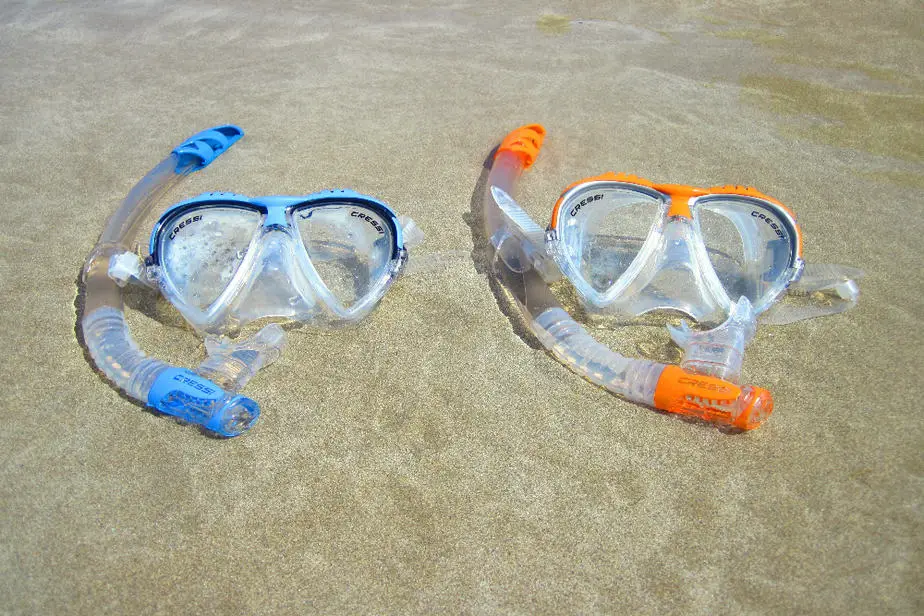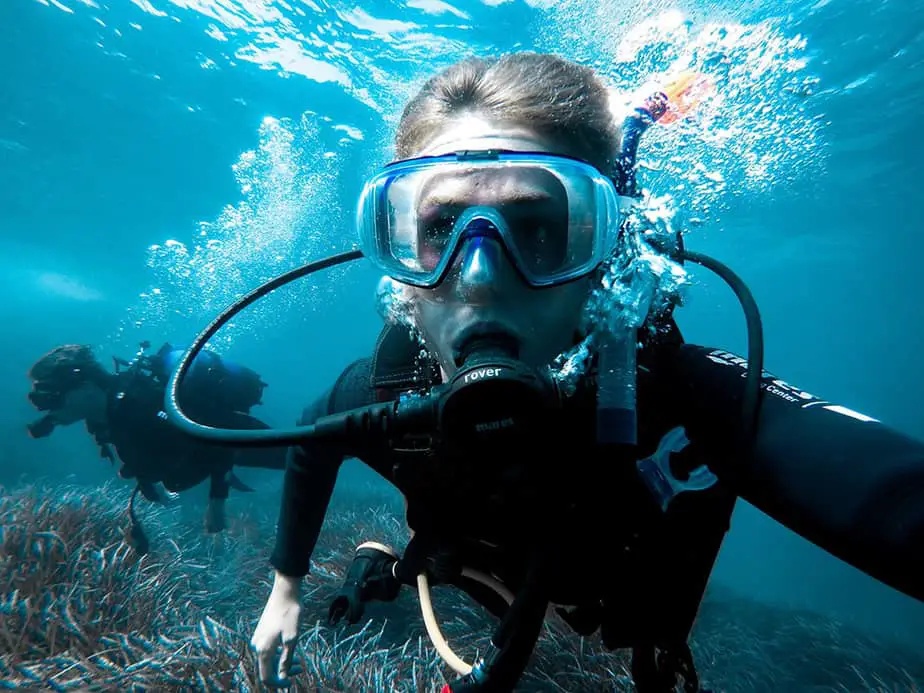Whether you’re snorkeling or scuba diving, you can benefit from using a snorkel. Why? The main reason is to conserve their air supply when they are at the surface so that they can have a full tank to start their dive. A snorkel is also useful after a dive if their tank is empty or they need to wait a long time for their boat to pick them up.
Snorkels have a lot of utility and scuba divers are using it to their advantage. If you’re diving with a group and are waiting around for everyone, why waste your precious air at the surface? Furthermore, keeping your head above water takes energy. With a snorkel, you can relax with your head underwater and still be able to breathe fresh air.
Additionally, if you are doing a shore dive, you will need to swim a bit to reach the dive site before you descend. During this time, since you aren’t even diving yet, it’d be a shame if you were already draining your air supply. With a snorkel, you can treat the swim out as a leisurely snorkeling session where you eventually end up scuba diving. And if the water conditions get too rough for a snorkel, then you can switch back to your tank and regulator.
As you can see, there are many benefits to using a snorkel for scuba diving. We’ve only scratched the surface in this introduction, and if you read on, we’ll discuss in great detail the rest of the benefits of wearing a snorkel for scuba diving.
Are snorkels necessary for scuba diving?
No, none of the advantages discussed so far are so beneficial that snorkels are required for diving. In fact, snorkels also have their disadvantages which we’ll discuss later on, and there is a debate as to whether a snorkel causes more problems than it solves.
With that said, in some situations they are very useful. Particularly for recreational diving, where divers have a limited air supply and are not as practiced or efficient, snorkels can help them conserve a lot of air and energy during any downtime.
For technical and commercial diving, the divers will be highly trained and efficient with their diving. A snorkel may even be a hindrance that creates extra drag due to its bulk, or a hazard to them if it gets caught on something. For this reason, many advanced divers are against the idea of scuba diving with a snorkel.
Advantages of scuba diving with a snorkel

Conserves air supply at the surface
There are times when you need to remain at the surface for some time before you can start your descent. For instance, if you’re doing a shore dive, you will have to swim a fair distance out before you descend. For boat dives in a group, if you’re the first one in the water, you’ll still have to wait for everyone else to dive in and get ready before you can descend.
If you were using your air supply all this time, you could have possibly used up 10-20% of it before you even started your dive.This is especially true if the water conditions are a bit rough and you are exerting yourself quite hard and consuming more air then usual. Instead, you could have been breathing through your snorkel to save your air supply for the real diving experience.
Helps with shore dives
Furthermore, during any surface swimming, you don’t even need to lift your head if you have a snorkel as you head in the right direction. This is also useful when you’re just waiting around because it takes energy to keep your head above water. You can then easily gauge where you are and where the best place to start your dive is.
In a similar vein, if you’ve just finished a dive and your tank is running low on air, you can use the snorkel to provide fresh oxygen as you swim back to shore or to your boat. As you can see, the common theme is that snorkels help you conserve resources, whether it be the air supply or your own energy, before the actual dive.
Caution: There are some situations where using a snorkel at the surface is more trouble than it’s worth. For short swims, a snorkel can potentially increase your carbon dioxide intake and you’d be better off just swimming while keeping your head above the surface. Another situation is if the waves are too rough, you should consider beginning your descent earlier instead of toughing it out on the surface with a snorkel.
Lastly, sometimes when waiting by the boat, you will inhale the boat’s exhaust through the snorkel which is an unpleasant experience. If you’re with a large enough group and the wait time is significant, you may be breathing these fumes for a while. If you cannot bear it, just use the regulator to avoid this problem.
Disadvantages of scuba diving with a snorkel

Although snorkels can help you conserve air and energy at the surface, there are many divers who are adamantly against using a snorkel while scuba diving. Here are some of the reasons why:
Increased drag and pull
Scuba divers already carry plenty of gear with them. Having a snorkel just adds more bulk and is another piece of equipment to worry about. Strong water currents will pull on the snorkel and in turn yank the scuba mask strap which it is attached to.
This can potentially break the seal on your mask and cause a leak. Even if the seal remains watertight, the dangling snorkel will be tossed around like a leaf in the wind, bumping into everything which can get irritating.
With that said, depending on the design, not all snorkels suffer from this problem. Some snorkels have a sleek design that adds minimal drag and is kept out of your way for the most part. Sometimes, tilting your head to the side can decrease the drag caused by the snorkel.
Confusion with the regulator mouthpiece
We discussed at length the benefits that snorkels can provide at the surface. Once you’re underwater, it’s a different story. At this point, the snorkel is completely useless and perhaps even a nuisance. It can even be dangerous if you’re not paying attention.
For beginners who are not yet accustomed to diving, they may mistake the snorkel mouthpiece with their dive regulator in the initial portion of the dive. Getting a mouthful of saltwater is a bad start to a dive and can be dangerous if the diver panics. However, at least divers can figure out pretty early on if they do make this mistake.
Snagging hazard
Having a foot-long (sometimes even longer) plastic tube attached to the side of your mask is just begging for it to snag on something. For instance, it could get stuck in a reel line or your BCD hose. For this reason, dive instructors recommend against wearing a snorkel if you plan on going cave or wreck diving.
Although there are other pieces of scuba gear that suffer from the same problem, such as the regulator hose or tank valve, these are essential scuba gear that cannot be removed. Furthermore, the aim is to reduce the amount of loose, dangling items to decrease the risk of getting caught on something. Professional divers who are comfortable in the water tend not to dive with a snorkel.
It can get in the way
Having a snorkel dangle unpredictably means it can sometimes get in your way. For instance, it can obstruct your vision and cause distractions. Or, it can block your hands from adjusting your gear or even get tangled up in your other equipment. However, this is an issue that most likely only affects newbies. Veterans have either figured out their own techniques to prevent this, or they forgo using a snorkel altogether.
A better approach to a traditional snorkel: folding snorkels
As you can see, there are actually a significant amount of disadvantages to diving with a snorkel as well. It can seem like a double-edged sword at times, and if you rarely use the snorkel at the surface, then it’s all downsides. However, the times when a snorkel would come in handy, you’ll really regret not having one with you. So how can we approach this problem?
Apparently someone was struggling with this issue so much that they came up with a solution: the folding snorkel. Also known as a collapsible snorkel, this product can be folded up and stored in your BCD pocket or clipped onto it. When you need to use it, you can access it easily, and when you don’t, you can stow it away.
Unfortunately, the design of the collapsible snorkel introduces a new problem. Since they have such a flexible design so that they can be folded, they can also bend at the surface and make it difficult for you to inhale fresh air. It also means that the carbon dioxide you exhale may not fully clear out. The increased effort just to breathe can be exhausting and the lingering carbon dioxide makes breathing with a collapsible snorkel difficult.
Therefore, if you decide to look into collapsible snorkels, try to get one from a reputable brand so that it can benefit you instead of hinder you. You need to find one that strikes the perfect balance between collapsibility for stowing purposes and ease of use at the surface.
Parting Words
While using a snorkel while scuba diving may seem like a hindrance to veterans, it can be a great safety net for beginners as they learn how to be better divers. Snorkels can help you conserve oxygen and energy at the surface if you need to wait at the surface for some time before you can descend. For instance, if you need to swim to your dive site or are waiting for the rest of the group to enter the water, you don’t want to waste your air supply before you even start diving.
The argument against using a snorkel is that it is completely useless once you’re actually diving. A snorkel increases bulk and drag, can snag on things, and generally just gets in the way once you’re underwater. A foldable snorkel can potentially solve these problems, but you need a good one that is easy to breathe through and folds up nicely. If you decide to dive with a snorkel, try to get a compact one that doesn’t get in your way.


